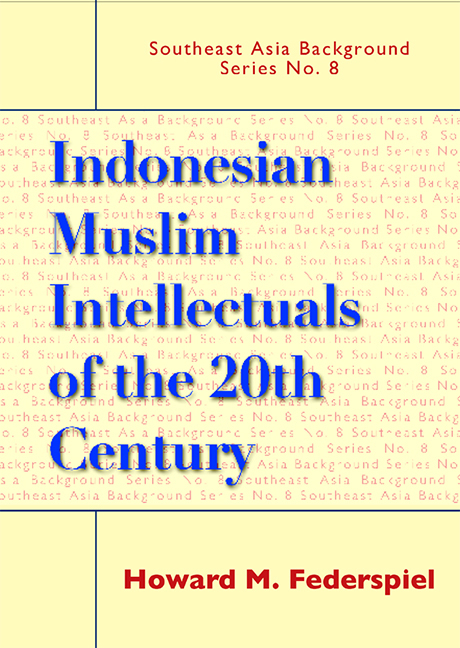7 - Conclusions
Published online by Cambridge University Press: 21 October 2015
Summary
Indonesian Muslim thinking reflected the major political developments of twentieth-century Indonesia. Accordingly, the creation and development of the Indonesian state was a central focus of their thinking. Further, the intellectual constructs that were presented were generally consistent with well-accepted notions in Sunni Muslim intellectual history, but at least twice prominent thinkers departed from orthodoxy. Those two ventures — concerning the superior place of reasoning in thinking and the use of a type of secularism — were not universally accepted by Indonesian Muslims, but they provided a leaven that was important in the progress of the intellectual movement that would not have happened otherwise. Overall, that thinking had several important features.
1. The creation and perpetuation of an Indonesian nation-state was important to nearly every intellectual in the group, with the possible exception of the first case at Aceh. It is apparent that nearly all identified with that state, wanted it to come into being before it existed, and supported it after it was created. If developments concerning the Indonesian state did not always go the way these intellectuals wanted it to, they generally did not give up hope and even adjusted their thinking to accommodate their identification with it. There were only a few exceptions to this trend.
2. The intellectuals identified with three Islamic communities. There was a historical Muslim community, identified especially with the Islamic Golden Age in the Middle East, which was referred to as the high point of Muslim civilization and as a model to be emulated. There were many references to such a historical community. There was a contemporary worldwide community of believers, which was implied but seldom given much attention, but recognized as existing and having some vague relevance to Indonesian Muslims. There were only a few indirect references to such a worldwide community. The third community was that of Indonesian Muslims which was regarded as having commonality, as striving for a historical mission, and as an important factor in determining the direction the Indonesian state should take.
- Type
- Chapter
- Information
- Indonesian Muslim Intellectuals of the Twentieth Century , pp. 91 - 94Publisher: ISEAS–Yusof Ishak InstitutePrint publication year: 2006



